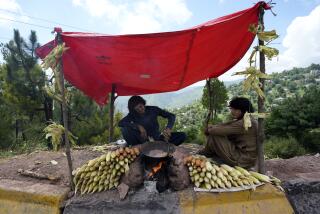IMF Infusion May Sustain Argentina
- Share via
WASHINGTON — The International Monetary Fund said Tuesday it is prepared to provide $8 billion in new loans to help the government of Argentina keep its ailing economy afloat and avoid a potential default on its foreign debt.
IMF Managing Director Horst Koehler urged the fund’s executive board to boost Argentina’s existing $14-billion credit line to $22 billion, the IMF said.
If the board approves Koehler’s plan, $5 billion in new funds would be made available immediately and the remaining $3 billion would be held in reserve. A final decision on the loan package is expected in early September.
Argentine officials are considering the possibility of embracing a voluntary, “market-based” program to restructure the government’s debt burden, Koehler said in a prepared statement. If an agreement is reached, he said, the fund would release the additional $3 billion to support the new debt payment program.
“The Argentine authorities have committed to strengthening fiscal adjustment, and to ensuring that the fiscal adjustment is sustainable,” the IMF said.
The emergency loan package could be a fiscal lifesaver for Argentina, which is struggling to survive a prolonged economic slump that has exacerbated a government cash-flow squeeze. It would help convince investors, both inside Argentina and abroad, that Latin America’s third-largest economy may manage to muddle through its ongoing financial crisis. And it would help relieve the anxiety of officials in Brazil and other Latin American nations whose own economies have been shaken by Argentina’s fiscal tremors.
Although the Bush administration has expressed skepticism in the past about financial bailouts of foreign governments, Treasury Secretary Paul H. O’Neill praised the Argentina rescue plan.
“This is an important step as we continue to work toward a sustainable long-term solution to Argentina’s economic problems,” O’Neill said in a statement. “A portion of the new program is specifically dedicated to assisting in a voluntary debt exchange to help make Argentina’s fiscal situation more sustainable.”
Just last week, O’Neill said the IMF effort should be directed toward finding a way to “create a sustainable Argentina, not just one that continues to consume the money of the plumbers and carpenters in the United States who make $50,000 a year and wonder what in the world we’re doing with their money.”
The government of President Fernando de la Rua is fighting fires on multiple fronts. It has a crushing foreign debt load, an economy now in its fourth year of recession, and a weakening market for its exports. Faltering confidence has caused international investors to dump Argentine bonds and stocks, while bank depositors have been steadily withdrawing their money.
The credit infusion could prove to be a short-term fix. Argentina’s debt noose tightens early next year when the current cost of carrying its nearly $130 billion in foreign debt rises significantly. But it would at least buy time in which the economy might turn around, start growing and generate the additional tax revenues the government needs to meet its future debt obligations.
In hopes of demonstrating newfound fiscal responsibility to the IMF, De la Rua’s government pushed through the “zero deficit” law, which requires the federal and provincial governments to spend only the tax revenues they take in, a novel concept for a country accustomed to borrowing to cover budgetary shortfalls.
Koehler’s rescue plan comes after nearly two weeks of nonstop negotiations in Washington between IMF officials and an Argentine team led by Finance Minister Daniel Marx. The talks seemed to falter as expectations of a quick resolution were dashed, and rumors of bailout plans produced no tangible results.
Argentine stock prices reflected the growing pessimism. The Merval market index fell 3.4% Tuesday. Brazil’s Bovespa index lost 1.7%. Mexican stocks bucked the trend, closing up 0.5%
Much of Argentina’s current crisis is attributable to the “convertibility” of its currency, the peso, into American dollars on a one-to-one basis. But the government insists it will stick with the dollar peg, because abandoning it would wreak havoc in the banking system and destroy the confidence of Argentine citizens.
Wharton School professor Mauro Guillen said that lack of export competitiveness has meant that Argentina has not been able to “export its way out of its crisis,” as Southeast Asian nations did after the 1997 financial contagion in their region.
*
Vieth reported from Washington and Kraul from Mexico City. Associated Press contributed to this report.
More to Read
Sign up for Essential California
The most important California stories and recommendations in your inbox every morning.
You may occasionally receive promotional content from the Los Angeles Times.













